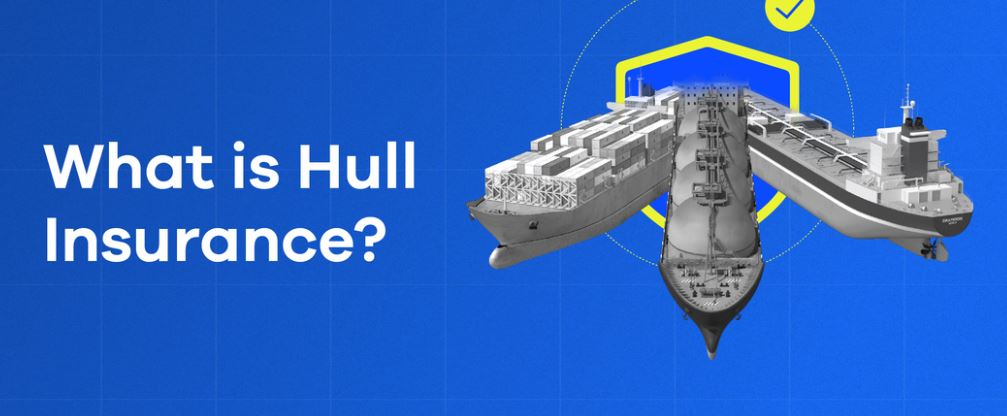A vital component of maritime operations, marine hull insurance provides vital defence for ships against a range of hazards. The nuances of marine hull insurance, as well as its kinds, advantages, and important factors for boat owners and operators, will all be covered in full in this comprehensive book.
What is Marine Hull Insurance?

A kind of insurance meant especially to safeguard a ship’s hull is known as marine hull insurance. It offers monetary security against harm to the ship from marine hazards such fire, grounding, collisions, and unfavourable weather. For shipowners, operators, and financial institutions interested in the safety and operational integrity of the vessel, marine hull insurance is essential.
Historical Background of Marine Hull Insurance
Marine hull insurance has its roots in the early years of maritime trade, when traders looked for strategies to safeguard their priceless vessels and cargo against the unpredictability of the ocean. Specialised marine hull insurance plans were created as the idea of covering a vessel’s hull developed throughout time. Modern marine activities require complete coverage, which is why marine hull insurance has developed into a highly specialised and intricate area.
Importance of Marine Hull Insurance
Financial Protection
This is primarily intended to offer monetary security against vessel damage. Without sufficient insurance, the high cost of replacing or repairing a damaged ship might place a heavy financial strain on shipowners.
Risk Mitigation
Insurance for marine hulls reduces the financial risks involved in maritime operations. Shipowners can operate more confidently and concentrate on their core business operations without having to worry about possible losses because the risk has been transferred to the insurer.
Legal and Regulatory Compliance
Operating a watercraft requires acquiring marine hull insurance in several areas. It is imperative to adhere to these standards in order to prevent penalties, legal conflicts, and even suspension of operations.
Types of Marine Hull Insurance
There are various types of this insurance that are intended to cover different areas of vessel protection. It is essential to comprehend these kinds in order to choose the right coverage for your boat.
Total Loss Only (TLO) Insurance
When a vessel is declared a total loss, either by actual total loss (ATL) or constructive total loss (CTL), total loss only insurance covers the loss. Whereas CTL happens when the cost of restoring the vessel surpasses its insured value, ATL describes circumstances in which the vessel is totally destroyed.
Full Hull Insurance
Comprehensive coverage for a variety of dangers, such as partial damages and total loss, is provided by full hull insurance. This kind of insurance is the broadest since it covers a wide range of risks and guarantees that the vessel will be protected in the event of both minor and severe incidents.
War Risks Insurance
Damages to the vessel resulting from war-related events, such as piracy, terrorism, and civil disturbance, are covered by war risks insurance. Ships operating in high-risk areas where such dangers are common need this kind of insurance.
Increased Value (IV) Insurance
Extra protection above and beyond the insured value of the vessel is offered by increased value insurance. This kind of insurance is helpful for paying for expenditures like salvage and legal fees that regular this nsurance might not be able to cover in full.
Key Considerations for Marine Hull Insurance
Scope of Coverage
Comprehending the extent of coverage is crucial. The degree of protection provided by various policies varies, so it’s important to select one that meets your needs. Examine the coverage and exclusions that are applicable.
Accurate Valuation
Determining the right amount of coverage requires accurate vessel appraisal. In the event of a loss, underinsurance may result in insufficient compensation, while overinsurance may raise premiums.
Deductibles
The amount that the policyholder must fork out before the insurance coverage begins is known as the deductible. Lower premiums are usually the consequence of higher deductibles, however in the event of a claim, the financial burden may increase.
Claims Process
Comprehending the claims procedure is crucial to guaranteeing seamless and prompt reimbursement. Become familiar with the paperwork needed and the procedures for submitting a claim.
Reputation of the Insurer
It is important to select a marine hull insurance provider that is reliable and has a solid track record. Seek out insurers who have a track record of dependable claim resolution and top-notch customer support.
Benefits of Marine Hull Insurance

Shipowners and operators can profit greatly from marine hull insurance, which makes sure they are sufficiently safeguarded against a variety of hazards.
Financial Protection
Financial protection against the costs of replacing or repairing a damaged vessel is offered by marine hull insurance. This guarantees that shipowners won’t have to endure severe financial losses in the wake of mishaps.
Risk Mitigation
Shipowners can operate with more confidence and concentrate on their primary business operations when they have marine hull insurance, as it transfers the financial risks to the insurer.
Legal Compliance
By helping shipowners adhere to legal and regulatory standards, marine hull insurance helps them stay out of trouble legally and prevent fines.
Challenges in Marine Hull Insurance
Although marine hull insurance has many advantages, there are drawbacks as well.
High Premiums
The cost of marine hull insurance can be significant, particularly for activities in high-risk regions and for valuable vessels. Budgetary restrictions and coverage requirements might be difficult to reconcile.
Complex Documentation
Preparing the paperwork needed for marine hull insurance can be difficult and time-consuming. Maintaining thorough and accurate documentation is necessary for a seamless claims procedure.
Conclusion
In conclusion, marine hull insurance is a cornerstone of risk management in the maritime industry. It not only protects the physical integrity of vessels but also supports the financial stability and operational continuity of maritime businesses. By prioritizing comprehensive this insurance coverage, shipowners and operators can navigate the complexities of maritime operations with confidence and resilience.



